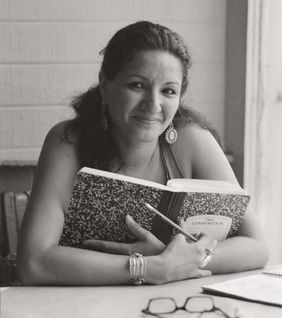Language-External Content
Born in Chicago in 1954, Sandra Cisneros was the only daughter in a family of seven children. Cisneros has fulfilled various roles as an activist poet, short story writer, novelist, essayist, artist, teacher, and counselor.
Early Years
In an interview from 2009, Sandra speaks about her experiences as a student in her early years. She attended both public and private schools in Chicago. The frequent moving and changing of schools led to a rather unstable learning environment for Sandra. Her performance in school often depended on the school and the teacher she was with at the given time. She recalls a particular time period in her education where she often could not focus and never really knew the answer when her teacher called on her. With news of receiving poor grades, Sandra was asked to bring her mother to school for a conference. The teacher described her as being a daydreamer. Looking back, Cisneros views this as a positive characteristic, but this was viewed as the opposite at that time (knopfgroup, 2009).
Despite the challenges of her years in elementary school, Sandra found a place she grew to love: the library. It was a place that offered her a calm environment with furniture built specifically for children and easels on which she could hang her artwork (knopfgroup, 2009). It provided a contrast and refuge from the otherwise busy environment of her home that was often filled with the noise of living with a large family. The library was a place where daydreaming and creativity were encouraged.
Community Activism
Sandra believes strongly in the importance of community activism. She has read poetry in schools, volunteered at art centers in Chicago, and has participated in workshops with other writers. In the early 1990's, Cisneros became more financially stable and was able to fulfill a wish of hers to form a writer's workshop. Although the workshop started in the dining room of her own home, it eventually because a non-for-profit which became known as The Macondo Foundation which works with writers who consider their work as part of a larger purpose for community building and non-violent social change (knopfgroup, 2009). An important focus in Cisneros' life is working to support writers to become successful and build a family of writers who believe in serving with the underserved communities.
Inspiration and Purpose
In her years as a a high school teacher and counselor, Cisneros questioned the power of the literature in which her students were being exposed. Aware of the struggles such as pregnancy, abusive relationships, and worse, Cisneros incorporated the familiar stories and struggles of her students in The House on Mango Street (Queirós).
"It seemed that literature didn't save anyone and was flimsy compared to the struggles of my young students. I wondered if I should have done something more practical like teaching these young women to control their fertility." -Sandra Cisneros
Concerned with the illiteracy and dropout rates of young latinos, Cisneros worries that young people often do not see themselves represented in the books they read. She feels that the lack of knowledge in their history leads to diminished understanding of their past and their overall sense of pride and self esteem.
Sandra speaks about the consequences related to having a low self-esteem, especially in young women. A great concern of hers is also in the high pregnancy rate of teenage girls. She acknowledges that one of the reasons for this occurrence is the lack of information that is available to young women. Cisneros is a big advocate for organizations such a Planned Parenthood, who help provide factual resources to the community about the ways in which the human body works. She recognizes that the Latino culture often does not acknowledge the issue of teen pregancy until it is too late. She wishes that that more time, money, and energy were spent on the prevention rather than on the after-the-fact care of young mothers. Her wishes are that young women dream bigger than a minimum wage job and raising children in their young years (knopfgroup, 2009). Through interviews and her work, Sandra sends the clear message that it's important for women to take care of themselves and their dreams first.
Present Day
After fifty-seven years of living in the United States, Cisneros now resides in San Miguel de Allende, a city in central Mexico. She explains that the reason for her move to Mexico was due to feeling at home, safe, happy, and connected to her community. Although born in the United States, Sandra states that she has always felt like a foreigner in her own country. She describes frequently feeling strange and not at home while in the United States. She recalls the looks and head-turning reactions from classmates when she raised her hand to speak in class. Turning this into a positive, Cisneros decided she had a special gift that no one else in her class had. She would dedicate her time to writing about the topics no one else could. Through her unique background and experiences, Sandra found her voice (UnivisionNoticias).
Relevance of Context
Cisneros' appreciation and acknowledgement in the importance of education has influenced both her life and the work she creates. She has moved to San Miguel, Guanajuato in Mexico, which has proven to be a major influence in her life. She is now thinking and writing in Spanish. She hears rhythms and lyricism in a different way. Even with these changes, Cisneros considers herself to be an anomoly in Mexican American society ("An Interview").
"The thing that is frightening, however, is that I’m an anomaly in Mexican society where single women are seen as spinsters, lesbians, or nuns. I’m none of the above. There are gringas who are single, but to be mexicana and single is very odd." -Sandra Cisneros
When asked about her decision to not marry or have children, Cisneros replied, "I've never seen a marriage that is as happy as my living alone. My writing is my child and I don't want anything to come between us." ("An Interview")
These aspects of her life, the decision to move to Mexico and not start a family of her own, can be seen in the way in which she uses language to contruct her work. Cisneros often using Spanish to replace words in a poem written mostly in English. She carefully selects the words to replace, concious of the power they hold to convey the intended message. The use of spanish words allows her to demonstrate her connection and identity in the Latino culture, but also uses topics that challenge patriarchal values that are prevalent and deeply instilled in the Latino culture.


